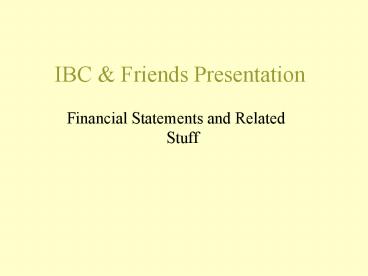IBC - PowerPoint PPT Presentation
1 / 28
Title:
IBC
Description:
Current Assets: Cash, Short-Term Investments, Accounts Receivable, Inventory, ... Companies invest in long-term assets that are used to run the business ... – PowerPoint PPT presentation
Number of Views:253
Avg rating:3.0/5.0
Title: IBC
1
IBC Friends Presentation
- Financial Statements and Related Stuff
2
FASBs Conceptual Framework
- SFAC No. 1 Objectives of Financial Reporting by
Business Enterprises - SFAC No. 2 Qualitative Characteristics of
Accounting Information - SFAC No. 3 Elements of Financial Statements of
Business Enterprises - SFAC No. 4 Objectives of Financial Reporting by
Nonbusiness Organizations - SFAC No. 5 Recognition and Measurement in
Financial Statements of Business Enterprises - SFAC No. 6 Elements of Financial Statements
3
Objectives of Financial Reporting
- Provide information useful to economic decision
makers - Allow decision makers to predict businesses
future cash flows (and cash flows they will
receive from these businesses) - Provide information concerning businesses assets
and liabilities and related transactions and
events
4
Key Attributes of Accounting Information
Decision Usefulness
Understandability Relevance Reliability
5
A Quick Trip through the Four Financial Statements
- Balance Sheet
- Income Statement
- Statement of Cash Flows
- Statement of Stockholders Equity /Statement of
Retained Earnings
6
The Balance Sheet
- A financial snapshot of a company at one point in
time.
7
The accounting or balance sheet equation
Assets Liabilities Owners Equity
Or
Assets - Liabilities Owners Equity
8
Questions Answered by a Balance Sheet . . . Among
Others
- How much cash does a firm have on hand?
- Does a company have sufficient cash to pay off
its debts that are coming due in the next few
months? - Does a firm have more long-term debt than its
major competitor?
9
Assets . . . defined
- Probable future economic benefits obtained or
controlled by a particular entity as a result of
past transactions or events.
Or
Things a company owns.
10
Types of Assets
- Current Assets Cash, Short-Term Investments,
Accounts Receivable, Inventory, and Prepaid
Expenses - Property, Plant Equipment
- Long-Term Investments
- Intangible Assets
- Other Assets
11
Liabilities . . . defined
- Generally . . . amounts by businesses to third
parties.
TYPES
Current Accounts Payable, Accrued Liabilities,
Notes Payable Long-Term Long-Term Notes
Payable, Mortgages Payable, Long-Term Accrued
Liabilities
12
Stockholders Equity
- Common Stock
- Additional Paid-In Capital
- Retained Earnings
13
BALANCE SHEET
14
The Income Statement
- Basic Format
- Revenues - Expenses Net Income
Revenues Increases in assets and decreases in
liabilities resulting from an entitys
profit-oriented activities. Expenses Decreases
in assets and increases in liabilities resulting
from an entitys profit-oriented activities.
15
Key Income Statement Items
- Gross Profit
- Operating Expenses
- Operating Income
- Earnings per Share
16
Questions Answered by a Companys Income
Statement . . . Among Others
- Did the company earn a profit during its most
recent fiscal year? - What was the firms gross profit percentage?
- What is the firms principal source of revenue?
17
INCOME STATEMENT
18
Statement of Stockholders Equity. . . A Few Notes
- Essentially, this financial statement is a
supporting schedule to the balance sheet. - Reconciles the beginning-of-the-year and
end-of-the-year dollar amounts of individual
stockholders equity items. - Question answered What events or transactions
accounted for the changes in a companys
stockholders equity over the previous year? - Note Instead of an S.O.S. many companies
prepare a Statement of Retained Earnings
19
Statement of Retained Earnings
- The statement of retained earnings reports that
portion of net income the company has retained,
or kept for use in the business - Net income increases retained earnings
- Dividends paid to stockholders decrease retained
earnings
20
STATEMENT OF RETAINED EARNINGS
21
Statement of Cash Flows
Four Sections
- Reveals how a business generated and used cash
during an accounting period.
- Cash flows from operating activities
- Cash flows from investing activities
- Cash flows from financing activities
- Reconciliation of a businesss cash balances at
the beginning and end of a year
22
STATEMENT OF CASH FLOWS
- Operating Activities
- Companies operate by buying goods and services,
which are sold to customers - Investing Activities
- Companies invest in long-term assets that are
used to run the business - Financing Activities
- Companies finance themselves by issuing stock and
borrowing money
23
Questions Answered by a Statement of Cash Flows .
. . Among Others
- How does a firms cash flows from its operating
(profit-oriented) activities compare to its net
income? - What was the major source of the companys cash
inflows during its most recent year? - During the past year, what was the firms major
cash outflow?
24
(No Transcript)
25
Accounting Gimmicks
- Asset Issues
- Inflating inventory
- Understating allowance for bad debts
- Overstating useful lives of depreciable assets
- Misclassifying current assets liabilities
- Capitalizing expenses
- Pumping Up Revenues
- Channel stuffing
- Bill and hold sales
- Grossing up revenues
- Front loading
26
Assorted Other Sordid Accounting Tricks
- Issuing pro forma earnings
- Bribes kickbacks
- Skimming cash receipts
- Lapping accounts receivable
- Lying to your auditors
27
A Few Red Flags
- Revenues rising but operating cash flows stagnant
or falling - Receivables growing more rapidly than sales
- Inventory growing more rapidly than accounts
payable - Complex/convoluted transactions
- Related party transactions
- Lotsa management turnover
28
Recent Accounting Disasters
- Enron SPEs SPVs
- WorldCom Capitalizing expenses
- Leslie Fay Inflating inventory
- Livent Overstating revenues (bogus ticket
sales) - Lincoln Savings Loan Swapping desert land to
produce bogus profits































